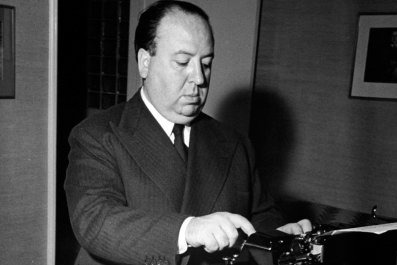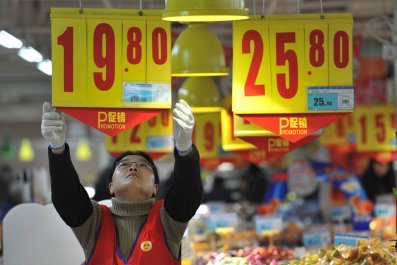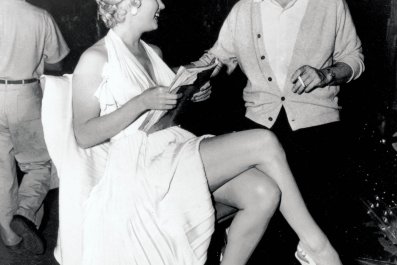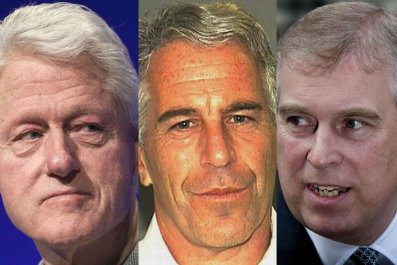"Mississippi doesn't have a huge specialty-coffee business," says Paul Bonds of Bean Fruit Coffee Company in Jackson, Mississippi. "When I first started my booth at a local farmers market, this guy came by who was about as Mississippi as they come." For the benefit of the crowd assembled at San Francisco's Palace of Fine Arts Theater for the fifth annual Good Food Awards, he adds a bit of local color: "He had on work boots—the kind you work in, not for style."
Bonds, who was here receiving an award—a pendant in the shape of a coffee mug—for his Ethiopia Yergecheffe Chele'lektu, recalls how he explained the varietals and provenance of the beans he was selling that day. There was the Ennaria, also from Ethiopia, with its honey, orange and lime juice notes, and the Finca los Cauchos from Colombia, tasting of cinnamon and dried apple. But after a minute, the good old boy'd had enough.
"Hell," he said. '"I just wanted regular coffee."
Mississippi may be a bit of an outlier here, at what has been dubbed the Oscars of the food movement (and Bonds himself is somewhat of an anomaly, being one of the few people of color onstage tonight). But Sarah Weiner, the woman behind the awards and the executive director of Seedling Projects ("a 'do tank' for the food movement"), says they always meant to be inclusive. "As of last year, we started having entries from all 50 states," says Weiner, 34.
Going from Brooklyn to Northern California, as I have in the last year, one could be forgiven for thinking that all the best local, sustainable, innovative food is produced in those two locales. (And I am not too surprised when Sabrina Meinhardt of Fort Greene's Greene Grape Provisions, my former locale in New York, introduces Bonds—and reveals that she got her start at SF's Bi-Rite Market, sort of a Bauhaus of food movement grocers.) Tonight there are awards given in 11 categories (beer, charcuterie, cheese, chocolate, coffee, confections, honey, oils, pickles, preserves and spirits) from points as remote as Vermont (Eden Ice Cider's Heirloom Blend) and Florida (Royal Gourmet Company's Mango Marmalade) and as near as here. SF's Market Hall Food, for instance, won for its Chicken Liver Mousse (the incredibly creamy concoction is available for tasting, along with many other dishes displayed on long tables in the theater lobby after the awards), and the city's Guittard Chocolate Company is represented by its Collection Etienne 45% Cacao.
Gary Guittard takes his moment at the mic to lecture the assembled on the history of chocolate-making in Europe, beginning with Coenraad Johannes van Houten's cocoa press in the Netherlands. He adds a special shout-out to John Scharffenberger, the Northern California sparkling-wine maker who brought artisanal French-style chocolate to the U.S.: "It certainly woke me up!" says Guittard, and while I worry for a second that I've fallen asleep in study hall, it seems that most of the assembled are paying close attention. It's an interesting mix of hipsters, entrepreneurs and small farmers, who've come for their moment of glory and to meet their fellow foodies.
At times there are dozens of people onstage, each wave of winners having their awards hung around their necks like Olympic athletes by the good-food godmothers, and judges, Alice Waters, Ruth Reichl and Nell Newman (of Newman's Own). Most started their business out of passion. "As a second-grader, I dreamed of being a beekeeper," says Emily Brown of Arizona's AZ Queen Bee, who won for its Pure Raw Honeycomb. (She adds later, "I didn't know you shouldn't work with bees when it's raining"—a lesson she learned after being stung 12 times.)
Getting food makers together to compare notes was part of Weiner's mission. After working for Carlo Petrini's Slow Food organization in Italy, she took a job as Waters's assistant and helped the Chez Panisse founder raise the first $400,000 for Slow Food Nation, a sustainable-food event that attracted over 50,000 people to San Francisco in 2008. It was there that Weiner heard a farmer say, "As a preserve maker, I very rarely talk to the cheese people or the coffee people or the chocolate people, and this gave us an excuse to work together and realize how many of the challenges we face are common."
A lot of this is about the business of being a small food maker and purveyor in a world where the odds favor the big guys. Wendy Mitchell of Avalanche Cheese in Colorado, after reflecting on the path that led her to raising goats and hiring and firing farm managers ("and sharing an office with a guy who wants to listen to the Mets all day instead of Beck"), gets the biggest laugh of the night when she quotes Mike Tyson: "Everyone has a plan until they get punched in the mouth."
In her closing remarks, Weiner (whom the San Francisco Chronicle dubbed a "hipster pixie," whatever that is) salutes the assembled food-crafters. "Ignoring business as usual, you build companies that feel like families, transform cities into tight-knit communities and support every social cause with a keg of beer or a wheel of cheese," she says. "You pay more than fair trade prices to people living thousands of miles away and are the No. 1 customers of farmers down the street. Your goats have names, and you call your bees 'ladies.'"
Growing up in St. Louis, Weiner always hated milk "until I was 16, summer backpacking through Europe, and drank fresh milk in Switzerland." Most foodies have a moment like this—for Waters it was an epiphany involving apricot jam on a baguette in France—but it's always about the flavor, not the locale.
"One of the most common criticisms of the food movement is that it's elitist because it's expensive, but it doesn't have to be," Weiner tells me later. "I always say, 'Buy less, buy better.' With the same budget you can eat well, and don't have seven jars of jam open in your fridge and then five of them go bad before they're gone."
But how did she see inside my refrigerator?
Correction: An earlier version of this article incorrectly stated that Amy Bennett of Greene Grape Provisions introduced Paul Bonds. Bennett's partner at Greene Grape, Sabrina Meinhardt, did the introduction.































